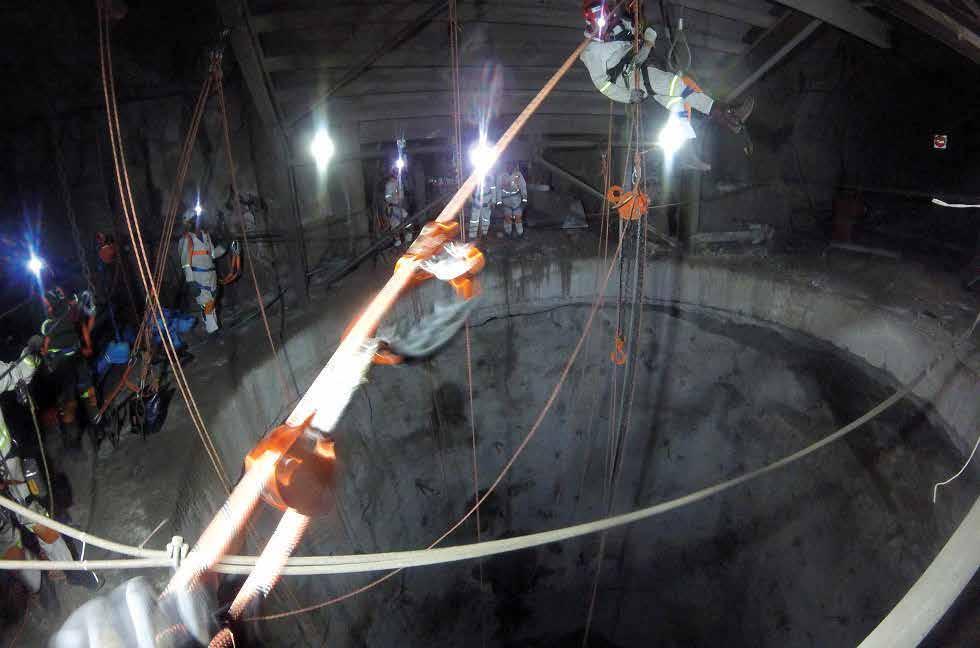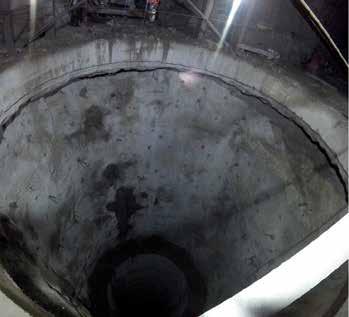
10 minute read
SGB-Cape launches QuikDeck
SGB-CAPE
INTRODUCES QUIKDECK IN AFRICA
By Nelendhre Moodley
As buildings go higher and mines get deeper, the demand for innovative access solutions continues to rise, with project houses servicing both the construction and the mining sectors seeking safe and efficient options to gain entry into difficult-to-reach spaces, says rope access manager Cobus Joubert of SGB-Cape Rope Access.
A service provider of access scaffolding and industrial access-based maintenance equipment, SGB-Cape has introduced QuikDeck, an alternative to the traditional scaffold, to the market. The product is gaining traction with numerous industry heavyweights, including Eskom and Sasol.
SGB-Cape Rope Access is a division of Waco Africa, which was established in 1948 and is the parent company to subsidiaries Form-Scaff, Sanitech, SkyJacks and Abacus Space Solutions.
The SGB-Cape Rope Access division was launched in 2016.
“As companies target zero harm, we can offer alternative solutions to scaffolding; not just because of the associated cost but also due to the extensive amounts of space it takes up and the large number of workers needed to truck in the products, off-load and carry them to site.
“For these reasons, there is a growing preference for alternative access methods, including QuikDeck and rope access, which deliver minimum disruption as workers get in and out of the work space much quicker. Importantly, fewer people and equipment are onsite, thereby reducing the risk of injury or fatalities.”
QuikDeck is a unique suspended access system that can be built while suspended in the air or on the ground and then hoisted into position. Aside from being easy and quick to assemble, the product can be dismantled just as speedily and relocated for use on another site.
“QuikDeck was launched in the US a few years ago and we were fortunate to have partnered with US-based Safway which brought the product to the African market. SGB-Cape first used QuikDeck during the construction of South Africa’s most recently developed coal-fired power plant, Kusile Power Station, in Mpumalanga.
“We used it during the peak construction stage and had about 5 000m2 of the QuikDeck suspended across multiple areas and multiple boilers.”
The product, which has successfully been used in the South African market for the past six years, supports higher loads with a load capacity of 366kg/m².
SGB-Cape used a variety of different access methods and products during the construction of the Kusile Power Station, including rope access, QuikDeck, scaffolding, mobile platforms and aluminium pop-up scaffolds.
Following the product’s success on the Kusile power project, SGB-Cape began marketing it to its extensive customer base. The company recently received an order from petrochemicals giant Sasol. “Apart from the interest being shown by construction contractors operating in Johannesburg for the QuikDeck, SGB-Cape is also looking to introduce the product to the oil and gas industry,” explains Joubert.
SGB-Cape and its sister companies place huge importance on safety: “We adopt stringent safety protocols not only because it is our social obligation to do so, but also because it is good business practice as it creates economic benefit by increasing efficiency and environmentally sound business practices.
“SGB-Cape adheres to zero harm to our people, clients, public workplace and environment. We are accredited members of multiple organisations, including the Institute of Work at Height, International

“QuikDeck is a unique suspended access system that can be built while suspended in the air. “ – Joubert


SGB-Cape used a variety of di erent access “ “ methods during the construction of the Kusile Power Station. – Joubert
There is growing demand for innovative access solutions.
Rope Access Trade Association, International Organisation for Standardisation, Corrosion Institute of Southern Africa and The South African Quality Institute.”
GROWING THE AFRICAN FOOTPRINT
With the construction sector in the doldrums, suppliers to the industry have long been eyeing mining for growth opportunities.
“The construction industry used to account for a big part of our turnover, but since its decline, we have shi ed our focus to the mining industry both locally and in Africa. In fact, our biggest growth is currently from the mining sector.
“As a solutions provider with an extensive range of access solutions, we believe that we o er massive benefits to the sector through cost savings and turnkey solutions. We are gearing to be at the forefront of the supplier list and the preferred supplier of access solutions to the mining sector.”
Among its achievements in mining, Joubert flags the role the company played in “assisting one of the big biggest platinum mines in Rustenburg install a new settler vertical sha to a depth of 1 000m” below ground.
“Using our range of access products, we assisted with lowering the steel sections in place and the rigging and safety systems throughout the project. By using rope access, we minimised the downtime that is o en associated with the traditional sca olding system. The project was delivered on time, within budget and with a 100% safety record. The mine was extremely pleased with the service.”
SGB-Cape has an extensive footprint in Africa with an established presence in Angola, Ghana, Democratic Republic of the Congo, Namibia, Botswana and Mozambique, and also leverages o the footprint of its sister companies, namely Form-Sca and Sanitech.
With a number of mining projects taking o in Ghana and Mozambique, SGB-Cape is targeting these areas as its potential growth prospects.
“We o er a whole range of solutions to customers, be it for projects on the ground, on sea and even for sha s going down to depths of more than 1 000m. SGB-Cape will be there to deliver solutions safely with the highest quality possible.” ■
SGB-CAPE OFFERING
■ SGB-Cape o ers five core services:
access sca olding, thermal insulation and cladding, rope access, industrial corrosion protection and asbestos abatement.
■ Our specialist rope access
services complement the group’s traditional sca olding, mobile elevated work platforms and suspended platforms, o ering an a ordable alternative to access hard-to-reach locations quickly, e iciently and with minimal disruption.
■ SGB-Cape operates in Africa
(South Africa and other sub-
Saharan African countries),
Australasia (Australia and New
Zealand) and the United Kingdom.


EQUIPMENT PRODUCERS

Hope for improved fortunes in 2022
By Nelendhre Moodley
South Africa’s highly specialised mining equipment suited to arduous conditions remains in high demand across the globe, including Africa. According to the CEO of the South African Capital Equipment Export Council (SACEEC), Eric Bruggeman, SA exports around R150-billion worth of specialised mining equipment for both underground and surface mining each year.
But, he says, given the mountain of challenges being faced, including the pandemic and its knock-on e ects and unrelenting load shedding, local equipment manufacturers are taking a huge hit to their businesses.
The SACEEC, which has a membership of 165 members ranging from large equipment producers such as Bell Equipment to small business with a turnover of less than R10-million per year, says the pandemic is causing upheaval in the supply chain, wreaking havoc on the timelines of product import and export across the globe.
“The supply chain challenges continue to have a massive impact on business. The lack of supply of steel and general shortages, for instance, are having a negative impact on the sector.
“These factors coupled with the recent riots and unrest, strike action by the National Union of Mineworkers and load shedding are all certainly not conducive to good business or sustainable production,” says Bruggeman.
These factors are having a ripple e ect across the entire manufacturing sector, especially the transport sector, which is having to deal with extended product lead times.
“Our borders are also not functioning normally – including the road border posts, ports and harbours. Overall this is a ecting the performance of the South African economy, as goods cannot be shipped in a cost-e ective way, and more importantly in a timely manner.
“In fact, the associated financial impact is massive and delivers a body blow of some several percentage points to our gross domestic product for this year.”
Despite the wide-ranging impacts, especially the disruption to the travel and exhibitions industries, the sector has found new ways of communicating with its client base, i.e. through one of many social mediums such as Zoom and webinars. While these mediums of connecting get the job

Brelko conveyor belts.
R150-billion
Value of specialised mining equipment that SA exports each year
done, they are not as e ective as business-tobusiness or face-to-face meetings.
“Our industry is not an online catalogue buying business; it is a highly specialised equipment trading sector designed to deliver products to specification. In particular, this new way of communicating with clients has had a huge impact on new business with new clients, given that face-to-face meetings were discouraged. To this, new business has been drastically reduced.”
But Bruggeman remains hopeful that in 2022 a semblance of normality will return with exhibitions and world travel once again on the cards, “as this remains the most e ective way to gain new business for our members”.
Bruggeman says the South African mining industry is not in a good growth position, with a lack of new mines and expansion projects being developed currently.
“There is insu icient investment into the South African mining sector and absolutely no growth of any large proportion currently under way,” says Bruggeman.
He says there could be greater political will injected into increasing investment appetite and creating a strong level of confidence in the sector – “something which is greatly lacking in our country at the present time”. ■
SACEEC HELPS MEMBER COMPANIES

■ SACEEC supports local
manufacturers of machine and equipment and capital equipment – including Brelko conveyor manufacturing, KAMA mine safety equipment, DFC valve manufacturing and R&E pumps, among others.
■ The council implements various
incentives for its members, including assisting them with exporting equipment and forming numerous partnerships with organisations around the world to help its members network with the international mining sector.
■ SACEEC also assists its members
with entry into new geographies and paves the way through appropriate introduction to the di erent buyers to ensure that the process is made easy, e icient and cost-e ective.
The Federation for a Sustainable Environment (FSE)
Promotes the ecological sustainability of development and the wise use of natural resources in Southern Africa It protects and promotes environmental health and functional ecosystems for future generations The FSE promotes sustainable and just social development as an inseparable consequence of natural resource use development projects
The FSE · Ensures that developments involving the consumptive or destructive use of natural resources specifically benefit local residents and parties directly affected by the development; · Informs all decision making in development, including in planning and monitoring activities, that affect local people and natural and environmental resources; · Takes action, including legal action, to hold decision makers accountable in situations where development may have negative social, economic or environmental impacts that affect people and the environment; · Ensures that the total cost of the use of natural resources including all externalised and long-term costs of maintaining ecosystem services to local people, are provided for and borne by the project; · Facilitates the remedying of existing environmental degradation; and · Mobilises collaborative national and local action among like-minded entities and raises funds and legal and technical expertise to support such actions.
Postnet Suite #113, Pivate Bag X153 Bryanston, Gauteng, 2021, South Africa Phone: (+27) 11 465 6910 Mobile: (+27) 73 231 4893 Email: mariette@pea.org.za









